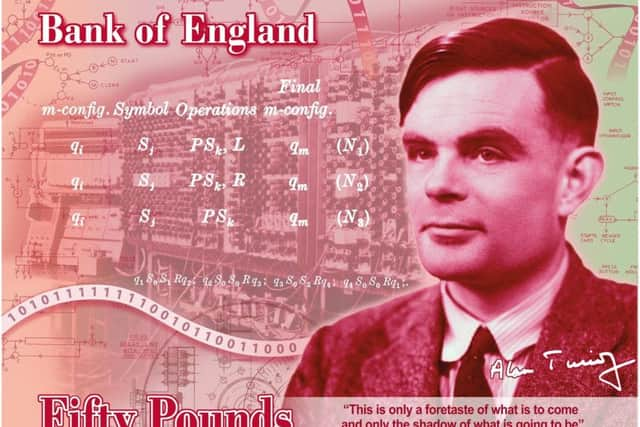Decision to honour Alan Turing on £50 note ‘must promote tolerance’
The mathematician, whose ingenuity helped crack the Enigma code during the Second World War and paved the way for the modern computer, will appear on the Bank of England’s new £50 note.
Turing, lauded nowadays as a war hero and the father of computer science, was prosecuted just seven years after the end of the conflict on account of his homosexuality.
Now 65 years after his death, he is set to grace the new polymer note that is expected to enter circulation by the end of 2021.


It will feature a quote from Turing, given in an interview to the Times newspaper on 11 June 1949, in which he vowed: “This is only a foretaste of what is to come and only the shadow of what is going to be.”
James Turing, the founder and chief executive of the Turing Trust, an Edinburgh-based charity that continues his great uncle’s legacy by providing reused computer and teacher training in sub-Saharan Africa, said it was important to qualify the honour.
He told The Scotsman: “The new £50 note is a wonderful dedication to Alan and his legacy and something that on a personal level is quite surreal. However, it doesn’t change how Alan was treated during his life, so my hope for this dedication is that it will help to remind us all that we must do better and strive daily to make the world a more tolerant and equal place.”
Turing was prosecuted for homosexual acts in 1952. An inquest concluded his death from cyanide poisoning two years later at the age of just 41 was suicide.
He was posthumously pardoned by the Queen in 2013, having been convicted of gross indecency.
The new banknote design will feature a photograph of him taken in 1951, as well as a table and mathematical formulae from a 1936 paper by Turing, which is widely recognised as being a foundation for computer science.
It sought to establish whether there could be a definitive method by which something could be assessed as provable or not using a universal machine.
The design will also feature technical drawings for the British Bombe – one of the main methods used to break Enigma-enciphered messages during the war.
Turing’s signature from the visitors’ book at Bletchley Park in 1947, where he worked during the war, will also be included, alongside ticker tape depicting his birth date – 23 June 1912 – in binary code, a concept which featured in Turing’s groundbreaking 1936 paper.